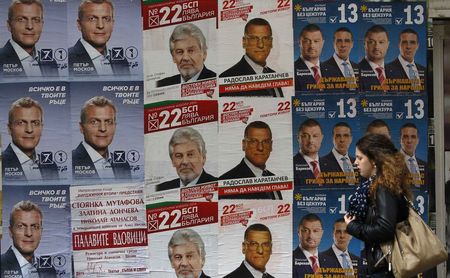By Tsvetelia Tsolova and Angel Krasimirov
SOFIA (Reuters) - Bulgarians began voting in a snap general election on Sunday, a poll that could leave them with another shaky coalition struggling to solve a festering bank crisis and revive growth in the European Union's poorest member state.
Led by a former bodyguard and karate expert, the centre right GERB party is expected to win but fall short of a majority, which could spark a period of haggling with smaller parties and the opposition to shore up support.
The new government will be the Balkan country's fifth in under two years, a period that has seen mass street protests topple a previous GERB administration and nearly fell its successor. Any more instability would be a turn-off for investors as well as voters, who have seen their country lurch from one crisis to the next. Foreign direct investment has fallen by more than a fifth this year.
A top priority for the new government will be to decide what to do with Corporate Commercial Bank (Corpbank) (BB:6C9), Bulgaria's fourth-biggest lender, which was closed after a run on deposits in June and whose fate has been in limbo ever since.
The bank's customers have been shut out of their accounts for more than three months and the bank's main shareholder is charged with embezzlement. But efforts to sort out the mess were derailed by political squabbles and it is still not clear as to whether the authorities will rescue the bank and how its depositors and bondholders will be treated.
The Corpbank crisis has fed disillusion with Bulgaria's political class. Seven years after the nation of 7.3 million joined the EU with high hopes of prosperity, corruption remains endemic while one in five Bulgarians lives below the poverty line. The average salary is just over 400 euros ($500) a month.
Bulgaria could be left with a fragmented parliament as disappointment with the main parties strengthens the attractions of fringe players.
"I decided to support some of the new faces. Why vote for those who have robbed us in the past years?" said shop assistant Lyubomira Besheva, in her thirties, who was accompanied by her daughter at the polling station.
"The majority of Bulgarians are not happy with the situation in the country but I keep hoping there'll be a positive change. The most important, of course, will be the creation of new jobs and the rise of incomes."
Bulgaria has been in the hands of a caretaker government since August, following the collapse of a Socialist-led administration whose year in power was overshadowed by mass protests, deadly floods and a row over Russian energy supplies.
Tucked into the EU's southeastern edge on the Black Sea, Bulgaria left Communism behind 25 years ago, but its loyalties are still divided between old ally Moscow and Brussels.
Heavily dependent on Russian energy, Bulgaria is among the countries most vulnerable to a gas supply cut if the standoff between the West and Russia over Ukraine continues in winter.
Bulgaria's new government will have to walk a diplomatic tightrope over the proposed construction of the giant, Russian-led South Stream gas pipeline, which will bypass Ukraine. Under pressure from the EU and the United States, Sofia reluctantly halted work on the project in June.
Whoever wins on Sunday will also have to persuade parliament to let the government raise new debt to fund a higher fiscal deficit and provide liquidity buffers for the banking system, and plug a large financial hole in the energy sector.

"I hope that the politicians will finally show some understanding, bury the hatchet and realise that most Bulgarians are struggling," said Petya Marinova, 47, an accountant, before the vote. "People are really fed up with their dirty games."
(Writing by Matthias Williams; Editing by Hugh Lawson, Greg Mahlich)
